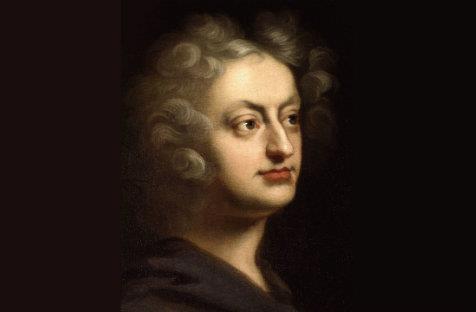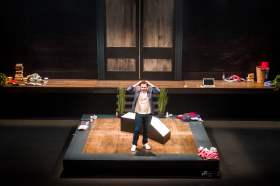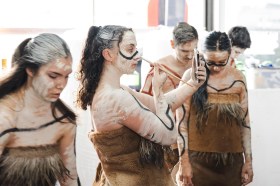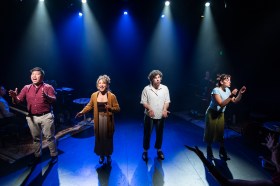I forget. At least I think I forget. What was it that I was supposed to be remembering? Oh, yes, the title of the concert, that umbrella of a name that, in the storm of an audience, all the selected pieces try to huddle under. (Sometimes they all fit, sometimes an arm, leg, shoulder, head is protruding out.) Yes, the title… What was it again? No, wait, I’ll remember. Yes! ‘Remember Me’, that was it. Because a concert name is very important, after all. No, really. How else would we distinguish between each concert, between each review that is written? Why, it’d be numerical chaos, it would be. ‘Concert 1’, ‘Concert 2’, and so on. (Not that that has stopped the Australia Ensemble from bothering to name theirs.) But yes, the name of the Sydney Philharmonia Choir’s latest concert was Remember Me, and I will remember it, I think, for a while yet.
It was a rather depressing Sunday afternoon – though perhaps I project myself onto the weather, instead of seeing the objective sunlight – at the City Recital Hall. The audience hadn’t exactly packed the venue, either, which is never a good way to start a concert. (How one’s heart can sink if, upon entering a theatre to watch a comedy, you find only half the seats occupied! Atmosphere is more important than some people realise.) And it baffles this critic as to why it was so sparse. It was certainly an attractive program, one thinks, for this part of the year is bereft of any opera, and so one would think that people would be jumping at the chance to hear another one. The opera on the program was Purcell’s Dido and Aeneas, to be given as a concert performance, and one wonders where all the fans of Pinchgut Opera (who stage an early opera in the City Recital Hall near the end of every year) were. But this critic was there, at least.
We began with Lachrimae, or Seaven Teares – 1: Lachrimae Antiquae by John Dowland, a purely instrumental piece, played by the Sydney Philharmonia Early Music Band. (That is, they play music from long ago, not that they get up early to play it.) This ran straight into Paul Mealor’s cycle Now Sleeps the Crimson Petal, sung by the Sydney Philharmonia Chamber Singers (as I’ve been told in my Sydney Philharmonia Free Program). It was a lovely set, with a great unity and control on display from the singers, conducted by Brett Weymark.
Another tear dropped after that – Dowland’s IV: Lachrimae Tristes – before Ross Edward’s Flower Songs was heard. (Ross Edwards makes, with this concert, his third foray into the Sydney musical scene in a fortnight. It’s his 70th birthday year, hence the attention.) The piece was the weakest of the night, not quite sweeping one up in the flow as much as one would’ve liked. Another tear rolled down the stage – Dowland’s VI: Lachrimae Amantis – and then it was Britten’s Five Flower Songs, which was the highlight of the first half, notable for its variety (from sweetness to gusto and all in between) and full sound from the choir. Indeed, it was a first half to savour, I found, with a tightness to the program that sometimes is lacking in Sydney Philharmonia concerts. There was a confident efficiency to it all, and the Dowlands served as valuable aural refreshments. (Curiously, while Dowland’s pieces were mentioned in the list of pieces at the start of the program, no more mention was made of him in the explanatory sections, unless I’m too blind to find it. Though there were texts of the poems on offer, thankfully – something that was missing from the recent concert the Choir gave with Eric Whitacre conducting.)
After the interval came Purcell’s Dido and Aeneas, sans text, sans surtitles, but glorious nevertheless. Mostly this was due to the superb performance of Fiona Campbell as Dido, as well as Anna Fraser and Penelope Mills as her women (as well as witches), whose voices fit very nicely together. But the Sydney Philharmonia Early Music Band managed a fantastically emphatic tour through the score, with a wonderful attention to the more excessive dynamics, as well as a lovely lilting quality when needed. Countertenor Tobias Cole as the Sorceress was eerily creepy, while Alexander Knight as Aeneas performed admirably as well. Yet overall there was a dramatic intensity present that often is not in concert performances such as these, and it went a long way to making the performances as memorable as it was. Remember Me? Most likely – this was one of the Sydney Philharmonia Choir’s best concerts of late, and it’s a shame more people didn’t see it.
Rating: 4 ½ stars out of 5
Remember Me
Sydney Philharmonia Choir
Brett Weymark (conductor)
Richard Butler (tenor), Fiona Campbell (mezzo-soprano), Tobias Cole (countertenor), Anna Fraser (soprano), Alexander Knight (baritone), Penelope Mills (soprano)
Sydney Philharmonia Chamber Singers
Sydney Philharmonia Early Music Band
John Dowland – Lachrimae, or Seaven Teares – 1: Lachrimae Antiquae
Paul Mealor – Now Sleeps the Crimson Petal
John Dowland – Lachrimae, or Seaven Teares – IV: Lachrimae Tristes
Ross Edwards – Flower Songs
John Dowland – Lachrimae, or Seaven Teares – VI: Lachrimae Amantis
Benjamin Britten – Five Flower Songs
Henry Purcell – Dido and Aeneas
City Recital Hall, Sydney
28 April





